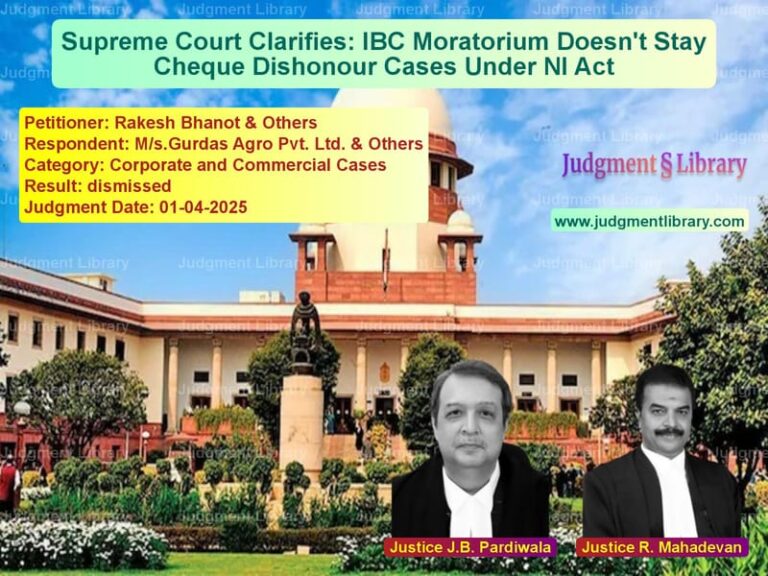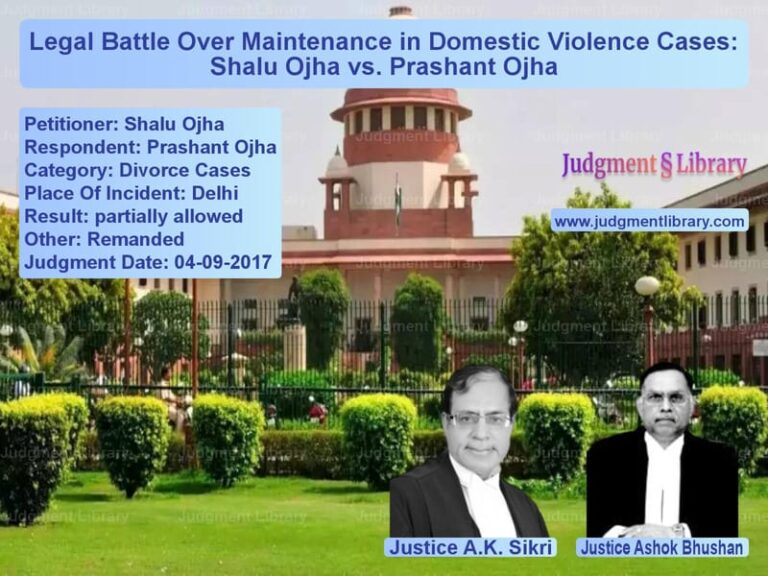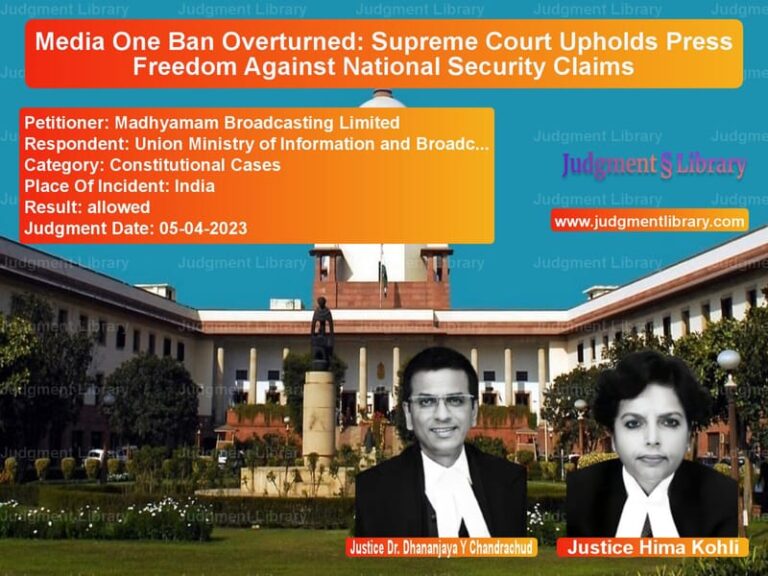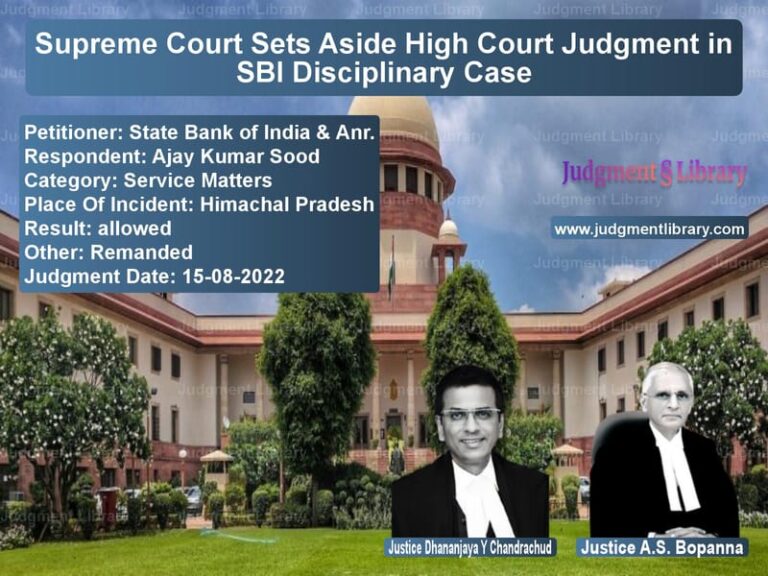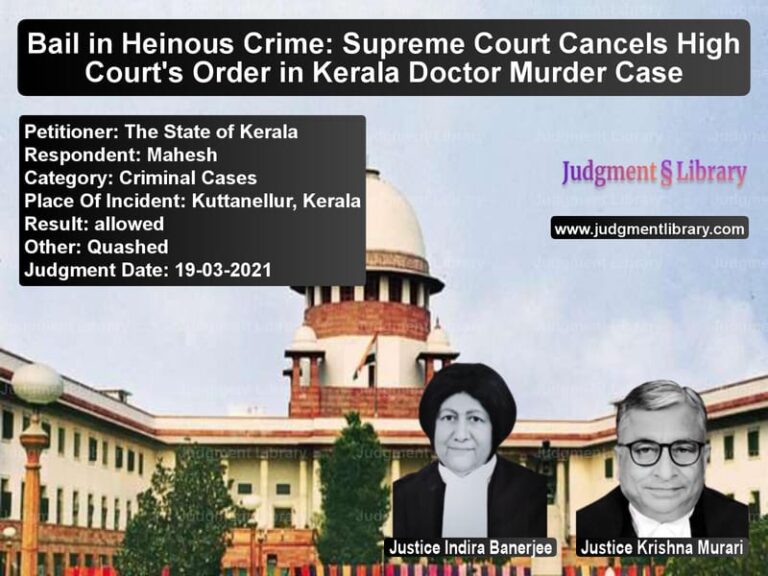Supreme Court Dismisses Habeas Corpus Petition in International Child Custody Dispute
The case of Jose Antonio Zalba Diez Del Corral v. The State of West Bengal & Ors. pertains to an international child custody dispute involving a Spanish citizen seeking the custody of his two minor children from his estranged wife, an Indian resident. The Supreme Court of India dismissed the Habeas Corpus petition filed by the petitioner, ruling that the custody issue must be resolved under the Guardians and Wards Act, 1890, and not through extraordinary writ jurisdiction under Article 32 of the Constitution.
Background of the Case
The petitioner, a Spanish national, was married to Respondent No. 6, an Indian citizen. They had two minor children, a 15-year-old son and a 10-year-old daughter. Following marital disputes, the respondent-wife left the petitioner and moved to Kolkata, India, taking the children with her. The petitioner filed a custody case under Section 12 of the Guardians and Wards Act, 1890, before the 10th Additional District Judge, Alipore, Kolkata, which remains pending.
Simultaneously, the respondent-wife filed a domestic violence case against the petitioner, leading to a maintenance order in her favor. The petitioner challenged this order, and the High Court reduced the maintenance amount. However, this matter was not central to the current petition.
Petitioner’s Arguments
The petitioner sought relief from the Supreme Court, arguing:
- The children’s safety and well-being would be better ensured in Spain, where the petitioner and his family reside.
- Kolkata was a high-risk zone for COVID-19, and the children’s health was at risk.
- The respondent-wife had illegally taken the children away from him, violating his custodial rights.
- Under international parental rights norms, both parents have an equal right to custody.
He relied on precedents such as Soumitra Kumar Nahar v. Parul Nahar and Yashita Sahu v. State of Rajasthan, which upheld the rights of both parents in child custody matters.
Respondents’ Arguments
The State of West Bengal and the respondent-wife countered the petition with the following arguments:
- The petitioner had already initiated proceedings under the Guardians and Wards Act, and this was the appropriate legal route for custody matters.
- The children were safely residing in Kolkata with their mother, and there was no immediate threat to their well-being.
- A Habeas Corpus petition was not maintainable since custody with the mother, a natural guardian, could not be considered illegal.
- The Supreme Court had previously ruled in Tejaswini Gaud v. Shekhar Jagdish Prasad Tewari that such cases should be adjudicated under the Guardians and Wards Act.
Supreme Court’s Observations
The Supreme Court examined whether extraordinary writ jurisdiction should be exercised in a case where statutory remedies were already available. The Court held:
“Habeas corpus proceedings are not meant to justify or examine the legality of custody, but rather to address wrongful detention. In child custody matters, where a parent has legal custody, a writ petition is not the appropriate remedy.”
The Court reaffirmed its stance in Tejaswini Gaud, emphasizing that custody matters should be adjudicated through appropriate statutory channels, considering the best interests of the children.
The Court also noted that there were no exceptional circumstances warranting intervention under Article 32. While the petitioner had concerns about COVID-19 risks in Kolkata, the State had submitted evidence that the pandemic was under control.
Final Judgment
The Supreme Court dismissed the petition, directing the petitioner to continue his custody claim under the Guardians and Wards Act. However, it urged the trial court in Alipore to expedite the proceedings and resolve the matter within six months.
Impact of the Judgment
The ruling clarifies several important aspects of child custody law in India:
- Limited Scope of Habeas Corpus: The judgment reaffirms that writ jurisdiction cannot be used as a substitute for custody proceedings under statutory law.
- Priority to Child Welfare: The Court emphasized that custody decisions should be based on the well-being of the child rather than the convenience of either parent.
- International Custody Disputes: The ruling underscores that Indian courts will prioritize domestic laws in deciding international custody cases.
Conclusion
The Supreme Court’s ruling in Jose Antonio Zalba Diez Del Corral v. State of West Bengal & Ors. reinforces the principle that child custody cases should be resolved through statutory frameworks like the Guardians and Wards Act, rather than through extraordinary writ petitions. The judgment ensures that parents cannot bypass established legal mechanisms for child welfare and custody disputes, thus maintaining judicial consistency and protecting the best interests of children.
Petitioner Name: Jose Antonio Zalba Diez Del Corral.Respondent Name: The State of West Bengal & Ors..Judgment By: Justice Vineet Saran, Justice Dinesh Maheshwari.Place Of Incident: Kolkata, West Bengal.Judgment Date: 28-07-2021.
Don’t miss out on the full details! Download the complete judgment in PDF format below and gain valuable insights instantly!
Download Judgment: jose-antonio-zalba-d-vs-the-state-of-west-be-supreme-court-of-india-judgment-dated-28-07-2021.pdf
Directly Download Judgment: Directly download this Judgment
See all petitions in Fundamental Rights
See all petitions in Public Interest Litigation
See all petitions in Judgment by Vineet Saran
See all petitions in Judgment by Dinesh Maheshwari
See all petitions in dismissed
See all petitions in supreme court of India judgments July 2021
See all petitions in 2021 judgments
See all posts in Civil Cases Category
See all allowed petitions in Civil Cases Category
See all Dismissed petitions in Civil Cases Category
See all partially allowed petitions in Civil Cases Category


